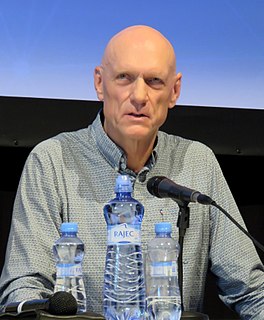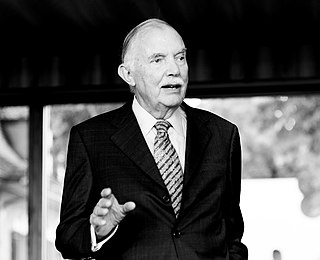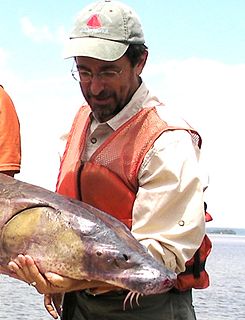Top 1200 Environmental Factors Quotes & Sayings - Page 2
Explore popular Environmental Factors quotes.
Last updated on April 19, 2025.
The environment is becoming so much a central concern, I see environmental concerns just bleeding into poetries all over the place. My hope is that we won't have these environmental poets tucked over here and everybody else doing cool stuff with language and consciousness elsewhere, but that all of it will become one thing.
Fast food may appear to be cheap food and, in the literal sense it often is, but that is because huge social and environmental costs are being excluded from the calculations. Any analysis of the real cost would have to look at such things as the rise in food-borne illnesses, the advent of new pathogens, antibiotic resistance from the overuse of drugs in animal feed, extensive water pollution from intensive agricultural systems and many other factors. These costs are not reflected in the price of fast food.
Long-term economic growth depends mainly on nonmonetary factors such as population growth and workforce participation, the skills and aptitudes of our workforce, the tools at their disposal, and the pace of technological advance. Fiscal and regulatory policies can have important effects on these factors.
Regardless of the extent to which the media promote "politically correct," but scientifically wrong, resolutions from professional societies such as the American Anthropological Association, facts remain facts and require appropriate scientific, not political or ideological, explanation. None of this should be construed as meaning that environmental factors play no part in individual and group differences. But with each passing year and each new study, the evidence for the genetic contribution to these differences becomes more firmly established than ever.
Accurate processing of information about outcomes is no simple task under the variable conditions of everyday life . . . usually, many factors enter into determining what effects, if any, given actions will have, Actions, therefore, produce outcomes probabilistically rather than certainly. Depending on the particular conjunction of factors, the same course of action may produce given outcomes regularly, occasionally, or only infrequently
But no matter how big the effort to push a propaganda line might be, climate change is bigger. This, undoubtedly and regrettably, is the biggest immediate long-term environmental challenge we face. A failure to concretely come to some policy outcome on climate change has not only a negative environmental impact but also social and economic consequences for us.
As a principle-centered person you try to stand apart from the emotion of the situation and from other factors that would act on you, and evaluate the options. Looking at the balanced whole-the work needs, the family needs, the other needs that may be involved, and the possible implications of the various alternatives - you'll try to come up with the best solution taking all factors into consideration. We are limited but we can push back the borders of our limitations.
As currently written, the laws require certain manufacturers and users of such chemicals to report any and all environmental releases-either accidental or routine-to air, water, or soil. The Toxics Release Inventory is the main registry of such events, and it is available to the public through the Environmental Protection Agency. It is hardly comprehensive. Toxic emissions reported to the federal government are thought to account for only 5 percent of all chemical releases.
There is a noticeable general difference between the sciences and mathematics on the one hand, and the humanities and social sciences on the other. It's a first approximation, but one that is real. In the former, the factors of integrity tend to dominate more over the factors of ideology. It's not that scientists are more honest people. It's just that nature is a harsh taskmaster. You can lie or distort the story of the French Revolution as long as you like, and nothing will happen. Propose a false theory in chemistry, and it'll be refuted tomorrow.
I am afraid that I think both the near future environmental reality and political landscape are not looking good - and they are connected. The best tool we have for advancing environmental solutions is our democracy, and we can't currently access it because it has been so thoroughly hijacked by big corporate interests.
The "environmental movement" is becoming an economic movement, is joining the social justice movement, is becoming a sustainability movement. It's leaving behind the "People's Needs versus Nature's Needs" conflict in favor of making the case for environmental health as the essential underpinning of prosperous and stable human civilization.
Personally, I’ve gotten so that I now use a kind of two-track analysis. First, what are the factors that really govern the interests involved, rationally considered? And second, what are the subconscious influences where the brain at a subconscious level is automatically conclusions in various ways — which, by and large, are useful — but which often malfunction? One approach is rationality… And the other is to evaluate the psychological factors that cause subconscious conclusions — many of which are wrong.
The environmental crisis is somber evidence of an insidious fraud hidden in the vaunted productivity and wealth of modern, technology-based society. This wealth has been gained by rapid short-term exploitation of the environmental system, but it has blindly accumulated a debt to nature-a debt so large and so pervasive that in the next generation it may, if unpaid, wipe out most of the wealth it has gained us.
I've won some awards. 'Time' magazine designated me as one of the environmental heroes of the 20th century. Oh, and I've got some honorary citizenships, like from the Conch Republic of the Florida Keys. But the one thing I am proud of is I didn't get the Chevron environmental award. Never did get that one.
Basically, for any complex to be sustainable needs to have a balance between two factors: resilience and efficiency. These two factors can be calculated from the structure of the network that is involved in a complex system. A resilient, efficient system needs to be diverse and interconnected. On the other hand, diversity and interconnectivity decrease efficiency. Therefore, the key is an appropriate balance between efficiency and resilience.
A seed depends on a whole host of factors to grow - from the fertility of the soil to the right mix of rain and sun to not being eaten by a passing bird. The same goes for an idea. For an idea to really take hold, other factors come into play, from timing to the emerging technology that makes it possible.
My attitude to peace is rather based on the Burmese definition of peace - it really means removing all the negative factors that destroy peace in this world. So peace does not mean just putting an end to violence or to war, but to all other factors that threaten peace, such as discrimination, such as inequality, poverty.
We must alert and organise the world's people to pressure world leaders to take specific steps to solve the two root causes of our environmental crises - exploding population growth and wasteful consumption of irreplaceable resources. Overconsumption and overpopulation underlie every environmental problem we face today.
Complex organisms cannot be construed as the sum of their genes, nor do genes alone build particular items of anatomy or behavior by themselves. Most genes influence several aspects of anatomy and behavior as they operate through complex interactions with other genes and their products, and with environmental factors both within and outside the developing organism. We fall into a deep error, not just a harmful oversimplification, when we speak of genes "for" particular items of anatomy or behavior.
The problem with an autobiography is that all these extra factors make it difficult. You don't want to hurt people's feelings. You don't know how much you can trust your memory. You don't want it to be self-serving. And you have all these issues about how to present yourself. All these factors make it harder to do than a novel.
It is a written fact that our people had warned of all these consequences of wrongful environmental behavior since our very first contact with the non-Indians. There was a time when our elders used to say to us, "You can't function with one foot in the white man's canoe and one foot in the Indian's canoe." With these extreme environmental concerns taking place on the earth, mankind is all in the same boat. Or better be.
Economic growth and environmental preservation are two sides of the same coin. There's no better illustration of that point than the California Clean Tech Open, which challenges California entrepreneurs to bring new, clean technologies to market. I encourage business leaders, policy makers, and environmental advocates to support this innovative, exciting competition.
Perseverance is my biggest lesson. When I started to get involved in environmental protection some years ago, my people did not take it seriously and they never considered it important. But today, people look at what I do and they truly recognize those efforts, and eventually they join you as "environmental activists" too!
To the greatest extent possible, I try to make choices that involve the least amount of cruelty and environmental damage. I'm interested in sustainable agriculture, environmental issues, human rights, and my interconnectedness in the web of life. It is a great pleasure for me to find products and practices that have a positive effect on living beings and the environment, rather than a negative one.
For decades, I thought that scientific truth, solid economic case studies, and common sense were enough to bring about change on the environmental front. After all, the data is so compelling! I thought that if people just understood the severity of today's environmental threats and knew about available solutions, those solutions would happen. Not so.
In judging our progress as individuals we tend to concentrate on external factors such as one's social position, influence and popularity, wealth and standard of education... But internal factors may be even more crucial in assessing one's development as a human being. Honesty, sincerity, simplicity, humility, pure generosity, absence of vanity, readiness to serve others - qualities which are within easy reach of every soul - are the foundation of one's spiritual life.
I've long had the idea that the factors that are most important in determining what we believe, how we live, and what we accomplish are matters of accident. That is, we did not choose where to be born, who our parents would be, or what we would look like. Yet those factors play an enormous role in almost everything about is. W/regard to issues of cosmopolitanism, the most obvious point is that how we identify ourselves in terms of nationality, cultural subgroups, and religion are all pretty much a function of where we were born.
When the number of factors coming into play in a phenomenological complex is too large scientific method in most cases fails. One need only think of the weather, in which case the prediction even for a few days ahead is impossible. Nevertheless, no one doubts that we are confronted with a causal connection whose causal components are in the main known to us. Occurrences in this domain are beyond the reach of exact prediction because of the variety of factors in operation, not because of any lack of order in nature.
Social evolution is a resultant of the interaction of two wholly distinct factors: the individual ... bearing all the power of initiative and origination in his hands; and, second, the social environment with its power of adopting or rejecting both him and his gifts. Both factors are essential to change. The community stagnates without the impulse of the individual. The impulse dies away without the sympathy of the community.
While it is becoming increasingly obvious that the fundamental architecture of a system has a profound Influence on the quality of its human factors, the vast majority of human factors studies concern the surface of hardware (keyboards, screens) or the very surface of the software (command names, menu formats).
Girls tend to attribute their failures to factors such as lack of ability, while boys tend to attribute failure to specific factors, including teachers' attitudes. Moreover, girls avoid situations in which failure is likely, whereas boys approach such situations as a challenge, indicating that failure differentially affects self-esteem.
We think the problem is out there, when the problem is really in here - who we are and how we experience the world around us. The acoustic ecologist listens, as the primary sense, to the world around us, and I believe that they have a significant contribution to make to all environmental groups who think that they're solving environmental problems, when we're actually all on a spiritual pilgrimage.
Global warming is not only the number one environmental challenge we face today, but one of the most important issues facing all of humanity... We all have to do our part to raise awareness about global warming and the problems we as a people face in promoting a sustainable environmental future for our planet.
Now is not the time to repudiate environmental balance, but rather it is the time for all of us to work together - politician, advocate, rancher, scientist, and citizen. Only by doing this will the United States move forward and be a leader in environmental issues and ensure sustainability to our delicate ecosystem.
The concept of national sovereignty has been an immutable, indeed sacred, principle of international relations. It is a principle which will yield only slowly and reluctantly to the new imperatives of global environmental cooperation. It is simply not feasible for sovereignty to be exercised unilaterally by individual nation states, however powerful. The global community must be assured of environmental security.
First of all, developed countries have basically expropriated the atmosphere of the world community. But one must say clearly that we redistribute de facto the world's wealth by climate policy. Obviously, the owners of coal and oil will not be enthusiastic about this. One has to free oneself from the illusion that international climate policy is environmental policy. This has almost nothing to do with environmental policy anymore.
Professionalism is environmental. Amateurism is anti environmental. Professionalism merges the individual into patterns of total environment. Amateurism seeks the development of the total awareness of the individual and the critical awareness of the ground rules of society. The amateur can afford to loose.

























































